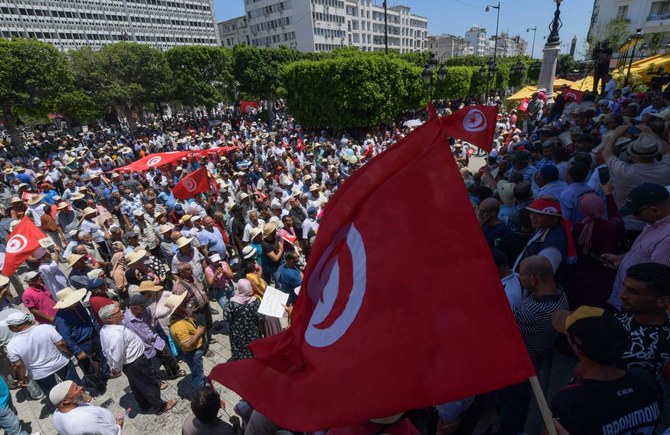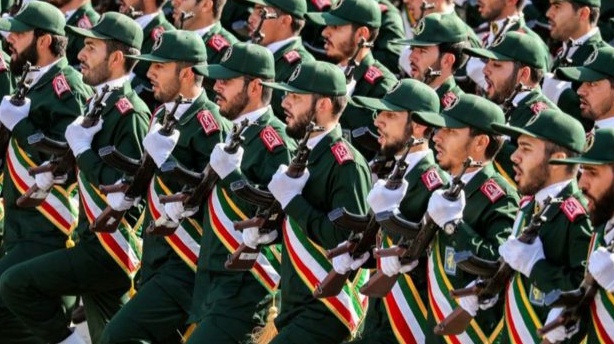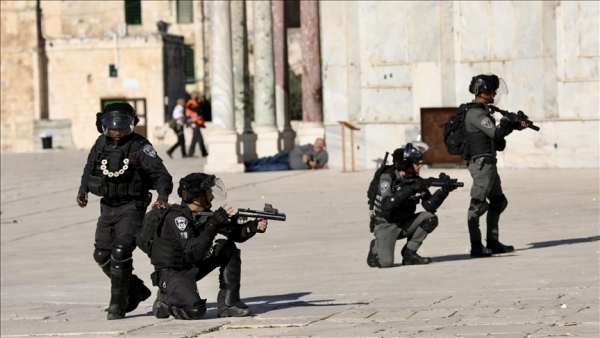
Tunisian President Kais Saied confirmed Tuesday that a draft constitution to be put to a referendum on July 25 will not enshrine Islam as the “religion of the state.”
“The next constitution of Tunisia won’t mention a state with Islam as its religion, but of belonging to an umma (community) which has Islam as its religion,” he told journalists at Tunis airport.
“The umma and the state are two different things.”
Saied took delivery of the draft text on Monday, a key step in his drive to overhaul the Tunisian state after he sacked the government and seized far-reaching powers last July in moves opponents called a coup.
Sadeq Belaid, the legal expert who headed the drafting committee, had told AFP in an interview earlier this month that he would remove all reference to Islam from the new document in a challenge to Islamist parties.
His comments, partly referring to Saied’s nemesis Ennahdha, an Islamist-inspired party which has dominated Tunisian politics since 2011, sparked a heated national debate.
The first article of Tunisia’s 2014 constitution — and its 1959 predecessor — defined the North African country as “a free, independent and sovereign state. Islam is its religion and Arabic is its language.”
The 2014 document was the product of a hard-won compromise between Ennahdha and its secular rivals three years after the revolt that overthrew dictator Zine El Abidine Ben Ali.
The new text, produced through a “national dialogue” excluding opposition forces and boycotted by the powerful UGTT trades union confederation, is meant to be approved by Saied by the end of June before being put to voters next month.
That is a year after the former constitutional law professor sacked the government, later consolidating his power grab by dissolving parliament and seizing control of the judiciary.
His moves have been welcomed by some Tunisians tired of the corrupt and often chaotic post-revolutionary system, but others have warned he is returning the country to autocracy.
Saied has long called for a presidential system that avoids the frequent deadlock seen under the mixed parliamentary-presidential system.
Asked about that issue on Tuesday, he said: “Whether the system is presidential or parliamentary is not the question.
“What counts is that the people has sovereignty. There’s the legislative function, the executive function and the judicial function, and separation between them.”
-AFP
 رئيس اللجنة التحضيرية للحركة السياسية لشعب الجنوب يهنئ بن شاجع بشهر رمضان
رئيس اللجنة التحضيرية للحركة السياسية لشعب الجنوب يهنئ بن شاجع بشهر رمضان
 أمين عام حزب العدالة والحرية يهنئ بن شاجع بحلول شهر رمضان
أمين عام حزب العدالة والحرية يهنئ بن شاجع بحلول شهر رمضان
 اليمن: شخصيات اجتماعية وسياسية تهنئ الشيخ بن شاجع بحلول شهر رمضان
اليمن: شخصيات اجتماعية وسياسية تهنئ الشيخ بن شاجع بحلول شهر رمضان
 تكتل قبائل بكيل يهنئ أبناء اليمن بحلول شهر رمضان ويدعو الجميع الاصطفاف لمواجهة التحديات
تكتل قبائل بكيل يهنئ أبناء اليمن بحلول شهر رمضان ويدعو الجميع الاصطفاف لمواجهة التحديات
 بن شاجع يدعو لمراجعة المواقف والتوحد أمام التحديات الكبيرة التي يواجهها اليمن
بن شاجع يدعو لمراجعة المواقف والتوحد أمام التحديات الكبيرة التي يواجهها اليمن
 محكمة سعودية تبرئ مستثمرًا يمنيًا قُتل تحت التعذيب بتهمة كيدية
محكمة سعودية تبرئ مستثمرًا يمنيًا قُتل تحت التعذيب بتهمة كيدية
 الأمم المتحدة: نقص المساعدات فاقم الوضع الإنساني المتردي في اليمن
الأمم المتحدة: نقص المساعدات فاقم الوضع الإنساني المتردي في اليمن
 مسلحون قبليون يفجرون خطاً لأنابيب النفط في مأرب احتجاجا على رفع أسعار الوقود بالمحافظة
مسلحون قبليون يفجرون خطاً لأنابيب النفط في مأرب احتجاجا على رفع أسعار الوقود بالمحافظة
 المبعوث الاممي يعلن موافقة الأطراف اليمنية على بنود خطة سلام دائم
المبعوث الاممي يعلن موافقة الأطراف اليمنية على بنود خطة سلام دائم
 مأرب: قتلى وجرحى بسبب رفع أسعار الوقود والقطاع القبلي مستمر
مأرب: قتلى وجرحى بسبب رفع أسعار الوقود والقطاع القبلي مستمر












 فيسبوك
فيسبوك  تويتر
تويتر  يوتيوب
يوتيوب 
قيامك بالتسجيل وحجز اسم مستعار لك سيمكنكم من التالي:- الاحتفاظ بشخصيتكم الاعتبارية أو الحقيقية.
- منع الآخرين من انتحال شخصيتك في داخل الموقع
- إمكانية إضافة تعليقات طويلة تصل إلى 1,600 حرف
- إضافة صورتك الشخصية أو التعبيرية
- إضافة توقيعك الخاص على جميع مشاركاتك
- العديد من الخصائص والتفضيلات
إضغط هنا
إضغط هنا